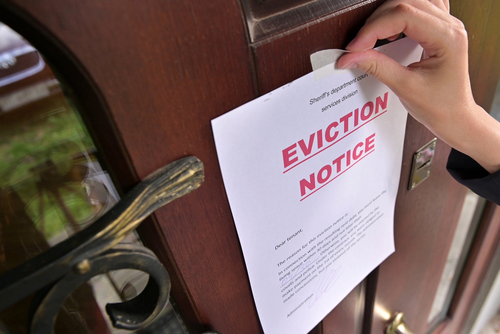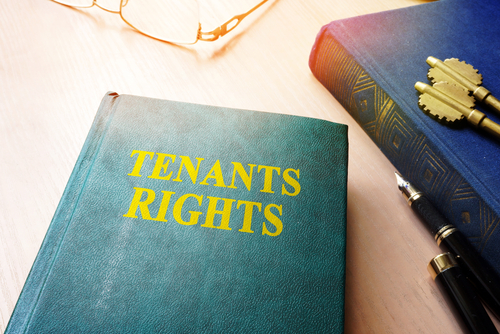Rent prices are increasingly higher than in previous years, leaving some tenants worried about making payments on time. If you’re having difficulty paying rent, you must talk to your landlord to ensure you are both on the same page. If you don’t know what to do if you’re unable to pay rent, read along as we go over the necessary steps and what may happen if you fail to pay.

Contents of This Article:
- What to Do if You Have Difficulty Paying Rent
- How to Ask for a Partial or Delayed Rent Payment
- Common Consequences for Nonpayment of Rent
- Looking for a New Housing Solution?
What to Do if You Have Difficulty Paying Rent
Over the past few years, average rent prices have skyrocketed, rising above $2,000 last May 2022. While it’s a standard recommendation to spend no more than 30% of your income on rent, that’s not realistic for everyone. If you find it difficult to make rent payments on time, work with your landlord or property managers in Washington DC to find a solution. Keep these tips in mind to ease the situation.

- Check Your Lease Agreement
- Talk to Your Landlord
- Rethink Your Budget
- Look for Assistance
- Know Your Rights
Check Your Lease Agreement
Check your lease agreement first if you know you’ll be late paying rent. Generally, your lease outlines your landlord’s policy for late payments or nonpayment of rent. Some landlords offer a grace period for late payments, but most lease agreements detail late fees and procedures for paying rent late. Either way, you’ll figure out whether you still have time to pay rent or need another solution.
Talk to Your Landlord
One of the most crucial steps you can take when you’re having difficulty paying rent is communicating with your landlord. Although it may be a difficult conversation, having an open and honest discussion ensures you’re both on the same page. You can explain why you can’t pay your rent on time and give details about your circumstances. If you can make a partial payment or know when you’ll have the money to pay rent, let your landlord know as soon as possible.
You could also ask your landlord if they’re open to other rent payment options. For instance, you could ask about paying rent on a different monthly date or using a rent payment plan. If one of these options works for your landlord, get it in writing to avoid future discrepancies.

Rethink Your Budget
Once you’ve talked with your landlord to find a solution to pay rent, the next step is to look at your budget. There could be several reasons why you need more time to pay rent. Whether you had a financially stressful month or a costly emergency, you’ll want to assess your budget.
Perhaps you lost your job or found yourself deciding between rent and other necessary expenses. In that case, you’ll want to communicate with your landlord to see if you can work out a rent payment solution. If you can’t work out an agreeable situation, consider finding a more affordable rental.
Look for Assistance
Suppose you anticipate facing an eviction or lease termination. In this case, research if any organizations in your area can help. Some groups that may offer help or resources include the following:
- The Salvation Army- Your local Salvation Army may provide one-time assistance if you need help paying rent or utility bills.
- Emergency Rental Assistance (ERA) Program- The ERA program gives eligible landlords or tenants up to a year’s worth of assistance funds through state and local organizations.
- The U.S. Department of Housing and Urban Development (HUD)- The HUD provides rent relief through its Section 8 clause. If you qualify for Section 8 housing, the department will pay most of your rent, while you’ll be responsible for 30% of a given month’s rent.
Know Your Rights
No matter the situation, knowing your rights as a renter is important. After all, eviction regulations differ depending on the state, city, or county. So, if you’re unsure how the process works or what steps to take once you’ve been served a notice, you’ll want to do some research.
Additionally, prepare to discuss payment issues with your landlord and offer evidence of financial hardship. Next, we’ll go over how you can request a partial or delayed rent payment from your landlord.
How to Ask for a Partial or Delayed Rent Payment
Some landlords may be more lenient than others regarding late rent payments. If you know that you’ll be late paying rent, there are specific steps you should take to ensure you and your landlord are on the same page.
- Give Your Landlord Plenty of Notice- If you know that you’ll be unable to pay rent, make sure you inform your landlord as soon as possible. It’s best to ask your landlord in writing for a few more days, if necessary.
- Explain Your Situation- When asking for an extension, explain why you need more time. Make sure that when you explain your difficulties, to emphasize that they are only temporary.
- Offer a Partial Rent Payment- If you can, offer your landlord a partial payment to ensure some of your rent is paid on time.
- Give Your Landlord Your Plan in Writing- If your landlord allows your late payment request, give them your plan in writing to pay rent by a specific date. Ensure that it won’t happen again, and you’ll pay rent on time from here on out.
- Be Prepared to Pay a Late Fee- Most landlords or property management companies have late fee policies for late rent payments. As such, even if you give your landlord notice, you may still get a late fee, so you’ll want to stay prepared.
Common Consequences for Nonpayment of Rent
While it depends on your landlord or property management company, you can expect some consequences if you pay rent late–or don’t pay it at all. Here are the most common implications and steps your landlord may take if you fail to pay rent.

- Notice to Pay or Quit
- Opportunity to Pay or Leave
- Landlord Files for Eviction
Notice to Pay or Quit
When you fail to pay rent on time or within the grace period outlined in the lease, your landlord sends a notice to pay or quit. This is the first step toward eviction proceedings. The statement should inform tenants to pay within a certain timeframe, or the landlord will continue with the eviction process.
Opportunity to Pay or Leave
Once you’re served a notice to pay or quit, you’ll have an opportunity to pay or leave. For example, if your rent is past due, your landlord can issue a 30 days notice to quit. No matter what you decide to do, it’s crucial to communicate with your landlord or property manager during this time.
Landlord Files for Eviction
If you fail to pay and communicate with your landlord, they’ll continue forward with an eviction. Although it takes time, once the court processes the paperwork, there’ll be a hearing for you both to attend. You’ll both have a chance to plead your case during the hearing. Therefore, you’ll want to bring all paperwork, including any communication between you and your landlord. Then, if the judge rules in favor of the landlord, you’ll either appeal or leave the property within a certain timeframe.
Looking for a New Housing Solution?
If you’re having difficulty paying rent, it may be time to find a more affordable rental. Whether you think it’s best to downsize or find a roommate, Bay Property Management Group can help you find the right rental home for you. On the other hand, if you’re a landlord and need help collecting rent payments, our expert property managers can help in that department, too.
Need More Advice? contact us today!
Bay Property Management Group offers comprehensive rental management services near Baltimore, Philadelphia, Northern Virginia, and Washington, DC. Contact us to learn more about our services and how we can help you succeed today.

